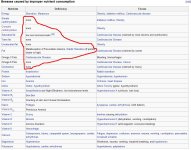i think they meant that each one individualy is not needed. for example you can exist without any simple carbs if you eat complex, or without any complex carbs if you eat simple. you must have some carbs to live. you cant live off fat and protein forever, your kidneys will be damaged from ketosis.
Humm not sure about that...
If they Say That a person is not eating complex carbs and it doesnt create any Deffiency Problems, Then it must be true.
The same about Simple.
They are not connected between each other.
BTW Carbohydrates are not needed for the human to survive.
I read an article yesterday that Said that Everything can be supplied by Eating Different Meat.
The Fat(Cholesterol) in meat will Aid in digestion by stimulating Bile Salts,it says that we can eat RAW meat without any problems.
Do i say to eat raw meat? No.... But im sure 100% That Carbohydrates are not needed at all, for the simple Fact, They in Some Protein products Theres some Carbohydrates like eggs.
They even says That FUEL is a better Source of Energy that your body want to use. And that glucose was just like a Turbo that you needed for say lets running from a Tiger or be in danger.
it stated that many Problems Came from overusing Glucose as a food Source.
Think about it, Glucose = Elevated Insulin.
The more you Elevate Insulin the Faster you AGE, The more you Elevate Insulin the more you become insulin Resistant.
BTW Beans, grains and legumes are not Natural,They are Toxic In their Natural Form, They need to be modified so we can eat them.
They say that many Dicease develop and came from the Agriculture History, Before that we mostly Ate Meat, Nuts,some fruits and Plants.
Heres something interesting.
Paleolithic Diet: How our bodies want to be treated.
The human genome has changed little over the past 40,000 years . Our ancestors developed agricultural practices about 10,000 years ago (see a Timeline). The advent of agricultural marked a chaotic period for our bodies to adjust to these foreign foods. The fossil record shows a massive decrease in average height, health, and rapid increase in disease, obesity, and population for cultures that survived the transition from a hunter-gatherer lifestyle to a agricultural dependent one. Women on high grain/carbohydrate diets become mature at an earlier age than their hunter-gatherer counterparts; thereby out-breeding and out-producing hunter-gatherers. Without this significant population boom, our diet as we know it could in fact be the same as it was before the advent of agriculture.
The diet of our pre-agricultural ancestors consisted of meats, insects, vegetables, fruits, and nuts. The advent of agriculture brought us potatoes, legumes (i.e. peanuts, beans, and soy), grains (i.e. corn, wheat, rice, barley, and oats), and processed foods (i.e. sugar, bread, pastries, alcohol, etc.). Furthermore, we have bred our plants to produce the biggest and sweetest (highest sugar content) fruits. The best example of this is the blueberry.
Compare a wild Maine blueberry to the modern grocery store blueberry and you will see a remarkable difference. The wild blueberry is small, and contains little sugar. It takes a handful of wild berries to equal the sweetness of two or three large commercial berries. However, in that handful of wild berries you are getting a far larger amount of antioxidants and nutrients than you would by eating commercial berries alone. Farmers didn't cultivate and breed our plants to grow the most nutritious fruit, just the best tasting fruit. This analogy can be said for most of our modern foods.
Carbohydrates:
"Carbo-loading" has become synonymous with healthy. But are foods high in carbohydrates really good for us? Dr. Wolfgang Lutz of Austria would say no. His clinical experience with hundreds of patients suggests that diets high in carbohydrates are actually detrimental to our health. It is Dr. Lutz's opinion that carbohydrates are unnatural and harmful components of our diet and actually damage the mucosal layer of the gastrointestinal tract. Once damaged, antigens are free to enter the blood stream and cause all sorts of immune responses.
But aren't carbohydrates essential for a healthy diet? The answer is no. Sam Singer, in The Biology of the People writes, "The brain's energy requirements can be met by between 100 and 145 grams of glucose per day, and most diets contain enough carbohydrate to provide the brain and other tissues with this amount of glucose on a daily basis. But even if a person's diet changes so that it never contains enough carbohydrate to provide this much glucose, the concentration of glucose in the blood will not change. This is because natural selection has provided our bodies with a means of manufacturing it from molecules other than carbohydrates....The conversion of these dietary components into glucose is so effective that Masai warriors, Eskimos, South American gouchos, and other peoples may live for long periods of time on foods that are exclusively of animal origin and that contain almost no carbohydrate. These people are vigorous and healthy, and we learn from their eating habits that carbohydrate is not dietary essential, because they have normal levels of glucose in their blood in spite of the fact that their diets contain almost no carbohydrate." 




















































































